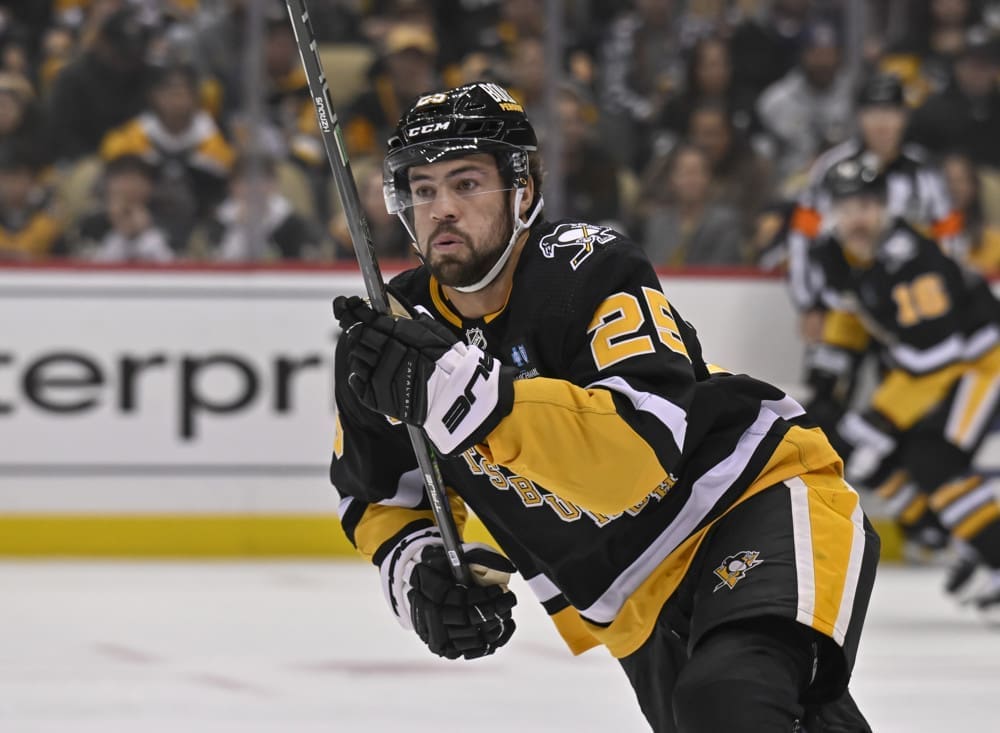Penguins
Don’t Forget These RFAs … Or Assume They’ll All Be Back

Players on the cusp of unrestricted free agency — guys like Jason Zucker and Tristan Jarry of the Pittsburgh Penguins — tend to get most of the attention as July approaches, and that makes perfect sense.
After all, most of them are established veterans and many fill significant roles on the teams for which they have been playing.
Deciding which UFAs-to-be should be re-signed, especially while operating within constraints imposed by a salary-cap system like the one in the NHL, ranks among the most critical decisions a GM faces during the offseason.
For Kyle Dubas, the president of hockey operations whose stint as interim GM is scheduled to extend past the start of free agency July 1, that will entail figuring out whether he should try to retain Brian Dumoulin, Josh Archibald, Nick Bonino, Danton Heinen and Dmitry Kulikov, as well as Zucker and Jarry.
Once he settles on which players he’d like to keep, Dubas must determine how much money — and how many years — he’s willing to invest in contracts for them to make that happen.
And, of course, those players must be interested in remaining with the Penguins, since they will be free to explore the open market in less than three weeks.
But Dubas also has to make a call on whether to extend qualifying offers to three players who spent at least part, if not all, of the 2022-23 season on the major-league roster: They are a pair of bottom-six forwards, Ryan Poehling and Drew O’Connor, and defenseman Ty Smith, all of whom are eligible for restricted free agency next month.
Giving a player such an offer — the deadline for doing so is June 30 this year — allows his team to retain the right to match any offer he receives from another club, or to receive compensation if it declines to match that offer. If no qualifying offer is made, the player becomes unrestricted.
Poehling and O’Connor are coming off contracts that carried salary-cap hits of $750,000, which means each would have to receive a qualifying offer of at least $787,500 (105 percent of the base salary in the final season of his expiring deal).
Smith’s base salary was $832,000, which means his qualifying offer must be at least $874,125.
Given the dearth of NHL-caliber young players in the Pittsburgh Penguins’ organizational pipeline, qualifying all three might seem like the easiest decision Dubas will have to make during his tenure as GM, and perhaps it will be.
But there is a potential complication with Poehling and O’Connor.
Both are eligible to take the Penguins to salary arbitration, and going there creates fiscal uncertainty that clubs — particularly the ones that might be working with serious salary-cap stresses — prefer to avoid, if at all possible.
The uncertainty of how an arbitration ruling can go is part of the reason so few hearings that get scheduled actually take place; teams and players generally find common ground rather risk having a third party award a salary one side or the other would deem to be unreasonable.
Teams have the option to walk away from an award if it exceeds a figure that is adjusted from year to year, although neither Poehling nor O’Connor is likely to approach it.
Per CapFriendly.com, the minimum “walk-away” amount in 2023 will be $4,538,958. That figure was set at $3.5 million in the collective bargaining agreement negotiated in 2012.
Along with Poehling, O’Connor and Smith, five players in the Pittsburgh Penguins’ organization who have not signed in Europe will be restricted this summer. They are forwards Jonathan Gruden and Valtteri Puustinen and defensemen Josh Maniscalco, Colin Swoyer and Peter Diliberatore.
All but Gruden will be arbitration-eligible if they receive a qualifying offer.












